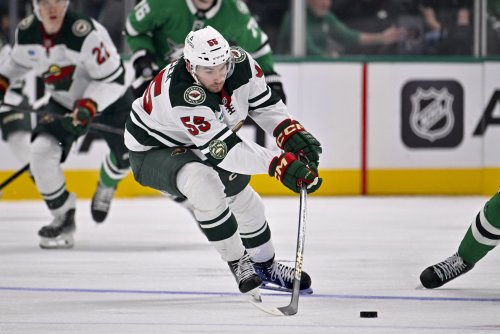
There's nothing wrong with that. The problem comes when we find a player who doesn't appear to work hard. Anyone come to mind? Probably you're thinking Ovechkin, Vanek, Kessel. Does ‘not working hard' (or not looking like it) equate to being a bad player?
Obviously not. But they certainly draw ire from fans. While a hooking penalty by Zach-Attack might be seen as him "trying too hard," that same penalty from Vanek is "well, he didn't skate hard enough to get there." If I had a nickel for every "lazy penalty" tweet I've seen about Thomas, I could retire right now.
So, this goes both ways; players that look like they are hard workers are usually loved, and those that look lazy are reviled. The problem is that that viewpoint leaves out something very important: ability. Moving beyond the obvious, there are a few problems in evaluating players based on "work ethic."
You'll note, I said "we" don't know how hard a player is working. Coaches almost certainly do, because they see players daily in practices, in regular life, etc. and they know which players work hard and which don't. Work ethic isn't something that can really be forced upon someone; either they will or they wont. It's far more to do with who they are rather than their coaching.
The other problem is: some people work hard to be ok, and some don't work hard and are great. It isn't fair, but it's a fact of life. When I first learned trumpet in 5th grade, I was the worst person in my class. I had to work very hard to be middle-of-the-pack in college, in high school, etc. The same is true for players. Some player simply don't have to work hard to be great (or another way to put it would be to say "they worked hard in practice so they don't need to in-game).
Still another problem with evaluating based on work level: not all players are called on to work hard. Wingers are responsible for jumping forward into attacks, and are defensively less culpable, generally speaking. Would it be nice to have Scandella-level defense from your wingers? Of course! But that would also mean stifling your offense, to some extent. Minnesota gets accused of this all the time: being a defense-first team at the cost of a limited offense.
The solution to a player who doesn't "work hard" is not to teach him, convince him, or coerce him into "working harder." The solution is put him in a situation that will allow him to succeed at his current work rate. Does that mean you can't teach someone to work harder? Of course not; but it's far easier to adjust for who a player is than try to change them; particularly in the case of a veteran.
Put another way: rather than trying to force a player to adjust to your system, coaches should adjust their system to fit the players they have. Certainly, bring in players who fit the system you want to play, but to refuse to adjust for others is simply nonsense.
This is where I think the Wild are open for criticism regarding Vanek. His play this year has been nothing but similar to his play in years before this; the only difference is he is shooting significantly less. This could be Vanek aging, but I think it more likely that he is being asked to be more defensively responsible than he has been in the course of his career, and that is causing him to shoot less.
In any case: before accusing a player of "not working hard," maybe consider that you don't really know if they are or not. Consider if they are being asked to, and consider if they could be better used in a different situation. And certainly consider whether they would be in the National Hockey League if they "didn't work hard."
Think you could write a story like this? Hockey Wilderness wants you to develop your voice, find an audience, and we'll pay you to do it. Just fill out this form.





.thumb.jpg.acd5dedd7251543624c6b47bfa6a1212.jpg)

Recommended Comments
There are no comments to display.
Join the conversation
You can post now and register later. If you have an account, sign in now to post with your account.
Note: Your post will require moderator approval before it will be visible.